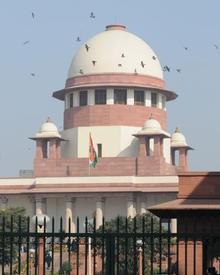Supreme Court Had Said 8 Years Ago
Had rapped Chhattisgarh in 2011 for treating Guha, Nandini Sunder, Swami Agnivesh and EAS Sarma as Maoists
Samanwaya.RautrayThe Supreme Court questioning Maharashtra police’s arrest of five social activists last week and reminder that dissent is a “safety valve” of democracy is not without precedence.
The top court had in 2011 rapped the then Chhattisgarh government for treating historian Ramchandra Guha, academic Nandini Sunder, social activist Swami Agnivesh and former bureaucrat EAS Sarma as Maoists or supporters of Maoists, for speaking up for the human rights of citizens.
“We were aghast at the blindness to constitutional limitations of… Chhattisgarh and some of its advocates in claiming that anyone who questions the conditions of inhumanity…rampant in many parts of that state ought to necessarily be treated as Maoists or their sympathisers…,” the court had said then.
A two-judge bench, comprising justices B Sudarshan Reddy and SS Nijjar had also ordered the state government to disband the rag-tag armed private militia propped up by the state to fight the Naxals.
“What was doubly dismaying to us was the repeated insistence…that the only option for the state was to rule with an iron fist, establish a social order in which every person is to be treated as suspect and anyone speaking for human rights of citizens to be deemed as suspect, and a Maoist,” the bench had said in its ruling.
The court had said that the problem lay in the “amoral political economy that the state endorses, and the resultant revolutionary politics that it necessarily spawns”.
Naxalism was a problem, it had said, citing a home ministry estimate that 120-160 out of 607 districts in Chhattisgarh were “Naxal infested”.
But the state cannot claim that it has a constitutional sanction to perpetrate indefinitely a regime of gross violation of human rights by adopting the same modes as done by Maoist/Naxalite extremists. The root cause of the problem, and hence its solution, lies elsewhere, it had said.
The justification often advanced by advocates of rapacious development push under neo-liberalism in India is that unless development occurs, via rapid and vast exploitation of natural resources, the country would neither be able to compete on the global scale, nor accumulate the wealth necessary to tackle endemic and seemingly intractable problems of poverty, illiteracy, hunger and squalor. “Whether such exploitation is occurring in a manner that is sustainable, by the environment and the existing social structures, is an oft debated topic, and yet hurriedly buried. Neither the policymakers nor the elite in India, who turn a blind eye to the gross and inhuman suffering of the displaced and the dispossessed, provide any credible answers,” the court had observed then.
“Worse still, they ignore historical evidence which indicates that a development paradigm depending largely on the plunder and loot of the natural resources more often than not leads to failure of the state; and that on its way to such a fate, countless millions would have been condemned to lives of great misery and hopelessness.”
“Instead of locating the problem in the socio-economic matrix, and the sense of disempowerment wrought by the false developmental paradigm without a human face, the powers that be in India are instead propagating the view that this obsession with economic growth is our only path, and that the costs borne by the poor and the deprived, disproportionately, are necessary costs,” the court had observed.
The fight against Maoist/Naxalite violence cannot be conducted purely as a mere law and order problem, to be confronted by whatever means the state can muster, it said.
“The primordial problem lies deep within the socio-economic policies pursued by the state on a society that was already endemically, and horrifically, suffering from gross inequalities. Consequently, the fight against Maoists/Naxalites is no less a fight for moral, constitutional and legal authority over the minds and hearts of our people,” the court had said.

Supreme Court Said:
We were aghast at the blindness to constitutional limitations of… Chhattisgarh and some of its advocates in claiming that anyone who questions the conditions of inhumanity…rampant in many parts of that state ought to necessarily be treated as Maoists or their sympathisers
The fight against Maoist/Naxalite violence cannot be conducted purely as a mere law and order problem, to be confronted by whatever means the state can muster
Our Constitution provides the gridlines within which the state is to act, both to assert such authority, and also to initiate, nurture and sustain such authority. To transgress those gridlines is to act unlawfully, imperilling the moral and legal authority of the state and the Constitution

September 5, 2018 at 11:22 pm
Maoists are not civil rights defenders as was shown in USSR, Cuba and China and even in India. So who are you hoodwinking?
September 7, 2018 at 4:03 pm
The court has rightly held that anyone working for human rights should not be harassed